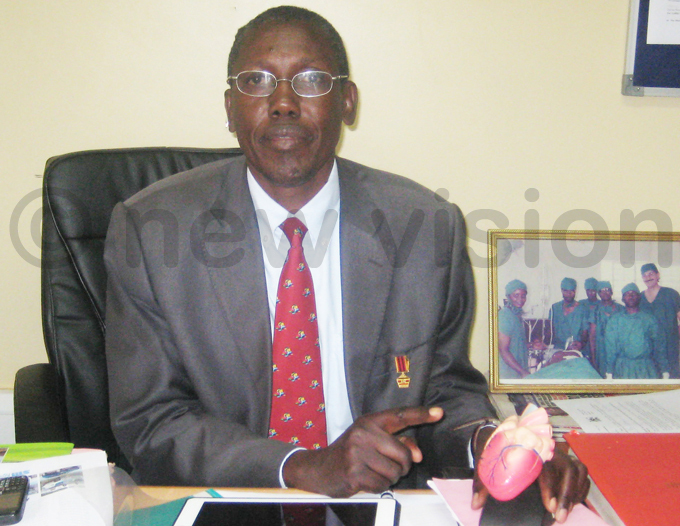One in four Ugandan adults has hypertension, heart disease
Not even HIV is that high!
Edmond Mulondo suffered a nagging chest pain and despite his dislike for hospitals, in July 2015, he decided to visit the Uganda Heart Institute at Mulago Hospital for a review.
Found to have high blood pressure, he was asked to remain at the hospital for further checks and a visit to the cath lab, one place he feared so much, found he had a triple blood vessel blockade.
"I was put on treatment and later recommended for surgery overseas. If it wasn't for that review at the Uganda Heart Institute, I would probably have passed on.
I really want to see people take more heart checks as a survivor because that chest pain you feel may actually be a heart problem" he said.
Dr Emmy Okello a consultant cardiologist working with the Uganda Heart Institute says more people in the country are being diagnosed with heart disease.
This is because the country now has more quality heart equipment's and treatment plus several highly qualified heart specialists trained here and abroad.
One in every four adult persons in Uganda has hypertension (high blood pressure) a heart disease and not even HIV is that high.
Dr John Omagino the executive director Uganda Heart Institute (UHI) adds that mismanagement of lifestyle is also to blame.
"Our diet is high on carbohydrates and low on fruits, vegetables and vitamins in general making us candidates for heart disease.
Whoever has some money now chooses a lifestyle of feeding on junk food and using the car at all times which is harmful to the body" Omangino said.
Okello says in addition to the unhealthy life styles people are exercising less. So far 36% of city dwelling children in Uganda are already obese.
 Dr John Omagino the executive director Uganda Heart Institute. Photo by Jacky Achan
Dr John Omagino the executive director Uganda Heart Institute. Photo by Jacky Achan
"To be on a safe side it's better to undertake routine checks, exercise at least three times a week, eat healthy.
Ensure there is more fruits and vegetables on the dining table" he said.
Okello added that things like junk food should be eaten in the morning because the body will burn the fats during the course of the day.
"Junk food if eaten at night will see the body retain the fats because it's redundant and this may lead to complications even of the heart. Evening meals should largely be made of vegetables and fruits to stay healthy.
On a personal level, if you cannot control what goes into your mouth then use you muscle, exercise. This means whatever you take in, the body must be able to burn" Omagino states.
Risk factors
- Raised blood pressure, cholesterol and glucose levels.
- Smoking (tobacco and illicit drug intake)
- Alcohol intake (can injure blood vessels or the heart directly)
- Stress (anxiety is way too high compared to the past were people lived simple lives and avoided heart complications. Now people have to compete to stay ahead of life, compete for jobs, pay rent, cater for transport, fuel the car, buy food, pay school fees the bills are just too many. Life is too stressful.
- Long life, in old age our body systems begin to fail. Even treatment for HIV, diabetes and kidney complications can lead up to heart disease.
- Poverty diseases like TB and rheumatic heart disease (sore throat) spread through coughing and inhaling germs in the air lead to cardiovascular diseases
- Obesity (cropping as a result of overeating unhealthy foods)
- Lack of exercise all can trigger heart disease and threaten our own lives, and those of loved ones.
According to Omagino its worrying that schools are being licenced to operate in flats and schools no longer have play grounds.
Also worrying is many new districts are being set up on one acre pieces of land and can't even afford to set up a playground for the locals.
At the Uganda Heart Institute on Thursday in a bid to curb heart disease, specialists ran an outpatients' clinic, a mini camp and offered routine heart checks free of charge in addition to teaching people to adopt a healthy lifestyle.
This as the world marked World heart day under the theme "Power Your Life" an encouragement to check for heart disease as a routine.
The World Health Organization (WHO) target is to lessen non-communicable disease mortality rate by 2025 by reducing the premature deaths because of cardiovascular disease.
Omagino says a controlled carbohydrate lifestyle, a healthy diet and exercise must be adopted by Ugandans to prevents risk factors for heart disease